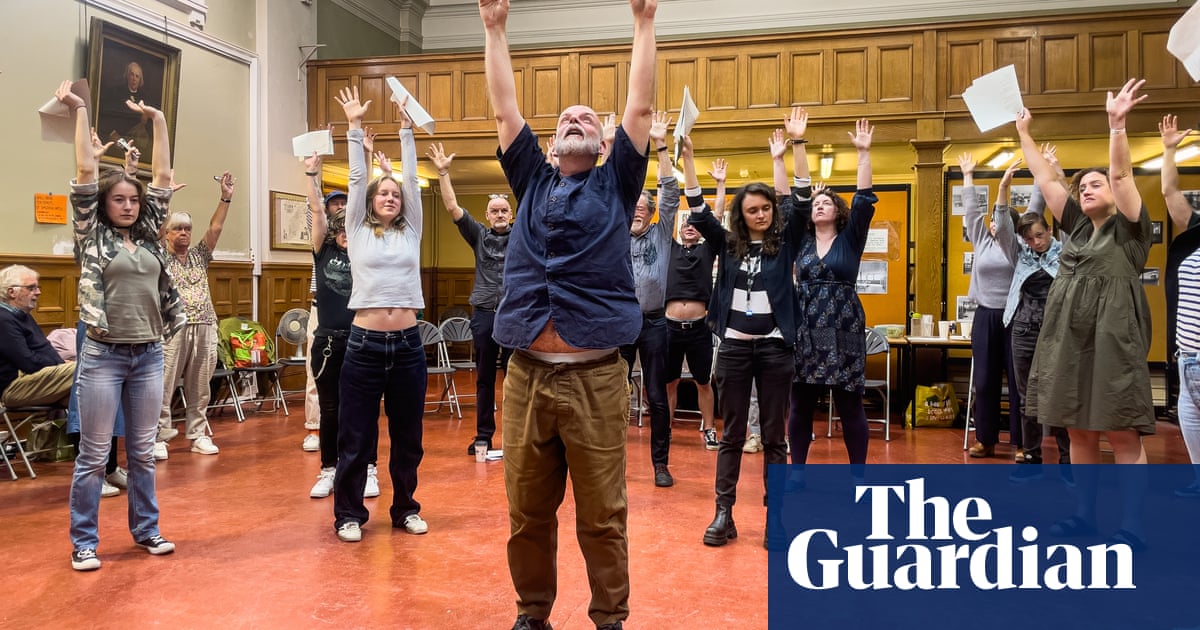
The audience in an upstairs room of Northampton Central Library thought they were going to spend Sunday afternoon listening to the debut gig of the Northampton Complaints Choir.
But choirmaster Joseph Kohlmaier has a surprise. The audience are going to be the choir. They will join with those of us who have been rehearsing a libretto for a song cycle created over research workshops during the weekend. “We have a-choired you,” says the twinkly eyed Austrian director of MusArc, an experimental choir collective invited to the town as part of Northampton Contemporary Art’s Sensing Place festival. Out of about 50 people, only one man resolutely declines. He sits on a chair while his wife joins us in warmup exercises.
The festival aims to “strengthen the connections between our individual identities and the environment we share”. And what could be a more British way than having a good old sing-song about how rubbish the town is?
I learn that there’s a lot to complain about in Northampton. Parking. The Market Square development that never seems to be finished. The dreadful council-commissioned mural depicting King Charles and the late Queen. Not to mention the bitter sectarian division between those in the town who pronounce the name of the river that runs through it Nen, and those who (ridiculously) call it Nene.
We intone spells to set the mood. Above us hang portraits of local worthies, including the great, mad Northamptonshire poet John Clare, whose wild eyes look, to me, sceptical.
Then we start the song cycle. The libretto draws on material culled from eavesdropping on street conversations, making rubbings of signs and reflecting on what it is that makes Northampton distinctive. Phrases are written on pieces of paper and assembled into songs. David Bowie did something similar.
The instructions from the choirmaster are nothing if not unusual. “I want you to whisper this with increasing paranoia,” Kohlmaier tells us as we stand in semi-circular rows around him. We hold up our libretti and whisper: “Town observes / through the body cam / of the paranoid officer / through wall-hung portraits / of balding men / through old papers / filled with marriage / births and more / town asks / who are you interesting / People?”
My favourite song is No Six in which choir member Illenia Cipollari leads one half the choir to chant a round of “Nen, Nene, Nen, Nene,” while the other half is led by Jamie Wignall who invites us to sing: “The satanic mills of Jerusalem / 127 metres high / sing with noise / sexy acorns / sing with noise / water mills / Witch me to grandness / I am hare / I am oak / I am here / Plough witching.”
What is all that about, I ask Wignall. He obligingly Googles “plough witching” on his phone and finds out that it was a venerable ritual in many rural parts, quite possibly involving cross-dressing boys blessing the plough after harvest time. I never did get to the bottom of that a “sexy acorns” line, though.
The final song is set to the tune of Amazing Grace, which was written by former slave trader turned abolitionist campaigner, the Rev John Newton, who lived in nearby Olney. “It’s to be performed rather like Gaelic psalm singing,” says Kohlmaier. “Give it lots of welly.” So we do, even though the words hardly scan:
Rebels, atheists and dissenters welcome.
How can we voice what is not yet here?
We live to dream, and dream to live,
Waiting to be surprised by hope.
Change people, radical thinking
I know something interesting
is sure to happen.
Incredibly, Northampton Complaints Choir ends its debut concert on an unexpectedly positive note.
What is the point of all this? Kohlmaier, whose day job is senior lecturer in critical and contextual studies at London Metropolitan University, tells me the first complaints choir arose in Birmingham in 2005, the brainchild of Finnish artists Tellervo Kalleinen and Oliver Kochta-Kalleinen. The phenomenon has since spread around the world with choirs in Budapest, Chicago, Tokyo and Jerusalem. In 2006, the Singapore government prevented a complaints choir from performing for fear it was too critical of the authorities.
While part of the point is to give voice to citizens who feel democratically marginalised, many complaints have nothing to do with politics. “Why can’t I grow a beard?” went one. “Why are vacuum cleaner cords always too short?” went another.
The Northampton complaints choir libretto and a video of the performance will now serve as a valuable resource for a town that, until now, nobody has honoured in song. There has been no equivalent of In My Liverpool Home, In Dublin’s Fair City, Empire State of Mind or even Newport State of Mind to capture the town’s manifold charms and failings.
Kohlmaier directs me to a lecture by literary scholar Steve Connor called Choralities which, he thinks, best captures the point of this delightful bonkers artistic practice. Connor writes: “Chorality is the means whereby we allow ourselves the collective hallucination of collectivity.”
That phrase resonates for me as I join in the performance. Several of the participants are regular choral singers and tell me they find the practice healing, especially in our increasingly individualised world. For half an hour, we become more than the sum of our parts and Northampton is transfigured from a town of complaint into a place worth celebrating.
Emer Grant, artistic director of the town’s NN Contemporary Art, tells me that Northampton is being put on the cultural map as never before. Next summer, the neo-Georgian former town hall at 24 Guildhall Road will reopen as a multistorey arts hub, with a new contemporary art gallery, cheap artists’ studios, broadcasting facilities for podcasters, and a zine shop inspired by one of the town’s most famous sons, Alan Moore. “We’re really trying to up the game for artist-led institutions, and the blurring of public/private shifts in creative practice.”
She takes me on a tour of the building site before the concert. Is this yet another example of a town seeking to gentrify itself by means of culture? She denies this: “It won’t be like Margate. Or Shoreditch. Or even Milton Keynes. It will be itself. It’s never had much of an organised artistic hub. But it will.” Northampton, if Grant has her way, will become a cultural destination to celebrate rather than moan about.
Back in the upstairs room of the library, Kohlmaier has one last task for the Complaints Choir before, like Ziggy Stardust, he breaks up the band. He invites us each to take a piece of coloured paper and write on it a word of phrase about Northampton. I write “More than cobblers”. Northampton, you see, has long been famous for shoe making. We place all the sheets on the floor and put them in columns. Then we chant the words in sequence.
The concert then concludes with everyone helping themselves to a slice of watermelon and a glass of prosecco. I take one last look at John Clare’s picture. Those eyes don’t look wild any more but filled with civic pride. Or maybe I’m just addled by endorphins. Choral singing will do that to a person.











